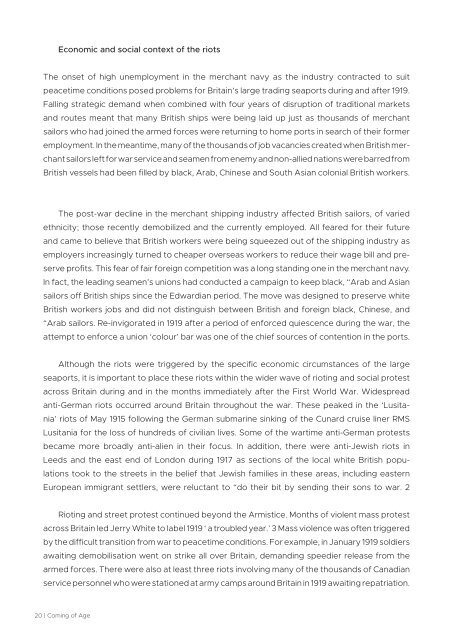Coming of Age : 1976 and the Road to Anti-Racism
Coming of Age : 1976 and the Road to Anti-Racism by Jagdish Patel and Suresh Grover
Coming of Age : 1976 and the Road to Anti-Racism
by Jagdish Patel and Suresh Grover
Create successful ePaper yourself
Turn your PDF publications into a flip-book with our unique Google optimized e-Paper software.
Economic <strong>and</strong> social context <strong>of</strong> <strong>the</strong> riots<br />
The onset <strong>of</strong> high unemployment in <strong>the</strong> merchant navy as <strong>the</strong> industry contracted <strong>to</strong> suit<br />
peacetime conditions posed problems for Britain’s large trading seaports during <strong>and</strong> after 1919.<br />
Falling strategic dem<strong>and</strong> when combined with four years <strong>of</strong> disruption <strong>of</strong> traditional markets<br />
<strong>and</strong> routes meant that many British ships were being laid up just as thous<strong>and</strong>s <strong>of</strong> merchant<br />
sailors who had joined <strong>the</strong> armed forces were returning <strong>to</strong> home ports in search <strong>of</strong> <strong>the</strong>ir former<br />
employment. In <strong>the</strong> meantime, many <strong>of</strong> <strong>the</strong> thous<strong>and</strong>s <strong>of</strong> job vacancies created when British merchant<br />
sailors left for war service <strong>and</strong> seamen from enemy <strong>and</strong> non-allied nations were barred from<br />
British vessels had been filled by black, Arab, Chinese <strong>and</strong> South Asian colonial British workers.<br />
The post-war decline in <strong>the</strong> merchant shipping industry affected British sailors, <strong>of</strong> varied<br />
ethnicity; those recently demobilized <strong>and</strong> <strong>the</strong> currently employed. All feared for <strong>the</strong>ir future<br />
<strong>and</strong> came <strong>to</strong> believe that British workers were being squeezed out <strong>of</strong> <strong>the</strong> shipping industry as<br />
employers increasingly turned <strong>to</strong> cheaper overseas workers <strong>to</strong> reduce <strong>the</strong>ir wage bill <strong>and</strong> preserve<br />
pr<strong>of</strong>its. This fear <strong>of</strong> fair foreign competition was a long st<strong>and</strong>ing one in <strong>the</strong> merchant navy.<br />
In fact, <strong>the</strong> leading seamen’s unions had conducted a campaign <strong>to</strong> keep black, “Arab <strong>and</strong> Asian<br />
sailors <strong>of</strong>f British ships since <strong>the</strong> Edwardian period. The move was designed <strong>to</strong> preserve white<br />
British workers jobs <strong>and</strong> did not distinguish between British <strong>and</strong> foreign black, Chinese, <strong>and</strong><br />
“Arab sailors. Re-invigorated in 1919 after a period <strong>of</strong> enforced quiescence during <strong>the</strong> war, <strong>the</strong><br />
attempt <strong>to</strong> enforce a union ‘colour’ bar was one <strong>of</strong> <strong>the</strong> chief sources <strong>of</strong> contention in <strong>the</strong> ports.<br />
Although <strong>the</strong> riots were triggered by <strong>the</strong> specific economic circumstances <strong>of</strong> <strong>the</strong> large<br />
seaports, it is important <strong>to</strong> place <strong>the</strong>se riots within <strong>the</strong> wider wave <strong>of</strong> rioting <strong>and</strong> social protest<br />
across Britain during <strong>and</strong> in <strong>the</strong> months immediately after <strong>the</strong> First World War. Widespread<br />
anti-German riots occurred around Britain throughout <strong>the</strong> war. These peaked in <strong>the</strong> ‘Lusitania’<br />
riots <strong>of</strong> May 1915 following <strong>the</strong> German submarine sinking <strong>of</strong> <strong>the</strong> Cunard cruise liner RMS<br />
Lusitania for <strong>the</strong> loss <strong>of</strong> hundreds <strong>of</strong> civilian lives. Some <strong>of</strong> <strong>the</strong> wartime anti-German protests<br />
became more broadly anti-alien in <strong>the</strong>ir focus. In addition, <strong>the</strong>re were anti-Jewish riots in<br />
Leeds <strong>and</strong> <strong>the</strong> east end <strong>of</strong> London during 1917 as sections <strong>of</strong> <strong>the</strong> local white British populations<br />
<strong>to</strong>ok <strong>to</strong> <strong>the</strong> streets in <strong>the</strong> belief that Jewish families in <strong>the</strong>se areas, including eastern<br />
European immigrant settlers, were reluctant <strong>to</strong> “do <strong>the</strong>ir bit by sending <strong>the</strong>ir sons <strong>to</strong> war. 2<br />
Rioting <strong>and</strong> street protest continued beyond <strong>the</strong> Armistice. Months <strong>of</strong> violent mass protest<br />
across Britain led Jerry White <strong>to</strong> label 1919 ‘ a troubled year.’ 3 Mass violence was <strong>of</strong>ten triggered<br />
by <strong>the</strong> difficult transition from war <strong>to</strong> peacetime conditions. For example, in January 1919 soldiers<br />
awaiting demobilisation went on strike all over Britain, dem<strong>and</strong>ing speedier release from <strong>the</strong><br />
armed forces. There were also at least three riots involving many <strong>of</strong> <strong>the</strong> thous<strong>and</strong>s <strong>of</strong> Canadian<br />
service personnel who were stationed at army camps around Britain in 1919 awaiting repatriation.<br />
20 | <strong>Coming</strong> <strong>of</strong> <strong>Age</strong><br />
<strong>Coming</strong> <strong>of</strong> <strong>Age</strong> Final version 16.10.indd 20 17/10/2017 12:06







